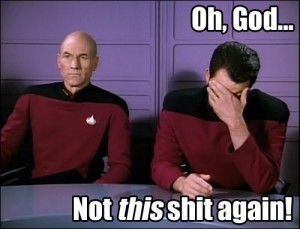(Sigh.) I’ve written about this before, but two stories that made the rounds this week have made an update necessary.
As new authors, we’re told “Reviews are for readers, not authors. Don’t read your reviews.” Or we’re told: “Read them, learn what positive stuff you can, then let them go, and be a damn adult about it.”
Hint: Being an adult does not involve intensive stalking or physical violence.
A few days ago, author K@thleen H@l3 got an essay into the Guardian, ‘documenting’ her reaction and response to a critical reviewer on Goodreads. (Summary: she doxxed and stalked the reviewer in some very creepysad ways.)
It’s uneasy reading for me, since I believe both author and reviewer behaved worse than middle-school girls fighting over who was more popular that week. (An aside for adults writing YA: write it, please don’t live it.)
The resulting freakshow adventure thus proudly documented is hard going, and worthy of many facepalms and repeated mutterings of ‘I can’t believe I’m reading this’.
A Jezebel article points out that H@l3 has done some awfully juvenile things before, and has powerful supporters in her court, raising the specter of acquittal by nepotism. Whatever. I don’t care, since I’m unlike to read anything in H@l3’s catalog or follow what that Goodreads reviewer thinks. I’m providing the links as cautionary examples of the following rule:
Goodreads is fun, but it shouldn’t ultimately matter. What people think on Goodreads, or Amazon, or Wattpad, or AO3, or wherever – shouldn’t matter. A one-star review might briefly drag down sales, or backlash into many sales as other readers take issue with the reviewer. Whether careful or clumsy, ‘gamed’ five star reviews stand out like hired ringers in a late night infomercial, and have about as much validity.
Reviews are only useful in aggregate, if they show positive or negative trends an author should notice. Good reviews are a source of happy ego-boosting, but even those should be taken with some skepticism.
If you are an author – especially an emotionally fragile author – take a lesson from TeddyGate and do not respond to negative reviews.
You probably shouldn’t respond strongly to positive reviews, either. (Once upon a time, Chris Brashear was Jaid Black’s biggest fan, was instrumental in the founding of the erotic romance publisher Ellora’s Cave, and went on to be a major force behind separate erotic romance publisher Samhain. The Brashear/Black friendship shattered in a lawsuit in the late 2000’s. Working for/with your friends and fans can be very dangerous, if you don’t take mutual steps to protect yourselves. You shouldn’t need to read Stephen King’s Misery to guess that.)
Which leads to one of the most shocking incidents I have ever seen (and I remember an agent being stalked on FourSquare): After Paige Rolland reviewed a story by Rich@rd Britt@in, the latter traveled several hundred kilometers to physically assault her. (Warning: the photos in that link are graphic accounts of a serious head injury.) Moreover, Britt@in apparently has a history of attempting to shout down negative reviewers, and seriously creepy stalkerish issues. (Author note: that assault link has been disabled, probably pending a court case.)
Update here.
I halfway expect self-published authors like Britt@in to lack the emotional distance to ignore bad reviews. I don’t expect people like H@l3, with strong industry connections and experience, to behave the same way.
Chill, folks, chill. And grow the hell up.
Update to the update 1-23-2014: Now Salon.com has looked at the matter, with some interesting analysis of the YA writing/reading culture.
